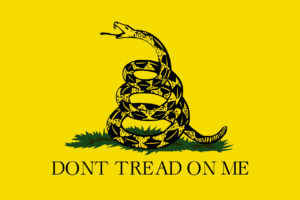
Today is, as many of you are surely aware, tax day in the United States. In my case, since I am usually entitled to a refund, I file my taxes as soon as I get my W-2s from my employer(s) and usually have my money back before the end of February . . . so you won’t see me in any late-night Post Office lines.
Tax day, however, is more than a day to file some paperwork to reconcile what’s already been taken with what is legally owed to our federal government. Today is a day to consider what the government does with all this money. This takes on new significance this year as we deal with an economic recession and a federal government intent on growing even more powerful and expansive.
Today, many of my countrymen are gathering at over 500 ‘tea parties‘ being held across the country to protest exorbitant federal spending and a government drunk on power it has not rightfully obtained from the people. I am flying the Gadsden Flag prominently today to join, at least in-spirit, with my fellow free-market, limited-government Americans.
Many do not know or understand how our representative republican government was intended to operate. Today, we consider its powers and authority as phrased in the positive: ‘the federal government can do anything except that which is prohibited to it by the Constitution.’ This is, however, not how the founders intended it.
A more correct way of expressing the legal authority of the federal government under the Constitution and the intent of the founders would be to phrase it in the negative: ‘the federal government can do nothing except those things permitted to it by the constitution.’
This is why many of the founders considered the Bill of Rights to be unnecessary, and thus why the Bill of Rights was not included in the core text of the Constitution. After all, the Constitution did not grant the federal government authority to limit speech or the press, so why would the rights to free speech and free press need to be explicitly stated? Thank God that the Bill of Rights was ultimately added through amendment, since the implicit limits on government authority have been roundly ignored for at least 100 years now and the explicit limits have often been the only thing protecting us from tyranny.
The authors of the Bill of Rights recognized that this might happen. They knew that by explicitly spelling out certain rights and limitations, they would be undermining the implicit limitations on federal power present in the core text of the Constitution. There was a fear—one that turned out to be frighteningly accurate—that by listing certain civil liberties the government could not limit, the government would then presume it had authority to limit any liberties not listed.
To counteract this, the authors of the Bill of Rights decided to explicitly codify the implicit limitation on federal powers. We all know about the First Amendment [free speech, press, religion, assembly], Second Amendment [right to bear arms], and others . . . but how many of us have ever read the 9th or Tenth Amendment?
“The enumeration in the Constitution, of certain rights, shall not be construed to deny or disparage others retained by the people.”—The Ninth Amendment to the U.S. Constitution.
“The powers not delegated to the United States by the Constitution, nor prohibited by it to the States, are reserved to the States respectively, or to the people.”—The Tenth Amendment to the U.S. Constitution.
The meaning of these two Amendments is simple and clear. My modern, colloquial translation of their combined text would read something like this:
“There are a lot more rights and liberties than those listed here, and just because something isn’t listed here doesn’t mean the government can limit it. If the Constitution doesn’t say the federal government can do something, then the federal government can’t do it. Period.”
So, tell me, where in the Constitution is the federal government granted authority to operate a retirement plan (Social Security)? Where is it granted authority to buy financial firms or car companies? Where is it granted authority to perform non-military scientific research? Where is it granted authority to build highways or regulate firearm sales or regulate employment practices or fund the arts or any of the other things our record deficit spending goes toward?
These are the questions we should ask this April 15. Where is our money going, and on what Constitutional authority is it going there?
I weep for the republic.
